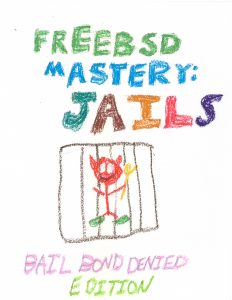Sudo Mastery, 2nd edition, is now complete. I’m doing the release slightly different this time, however.
Unsubstantiated pervasive rumors have it that books sell better if they’re available in all formats. The ebook is always faster to arrive than the print, because electrons are instantaneous. I’ve put the ebook on preorder until 3 September, about two weeks from today. This should give the paperback and hardcover time to propagate through all the bookstores. I’m dubious this will have any effect on sales, but you never know.
Also: for years now, people have asked me to put some of the tech book covers on T-shirts. I’ve finally done as requested. I originally wanted to run this directly through tiltedwindmillpress.com, but while the tech would be fun the tax implications would be unfun. So I fell back on Teespring, and set up a store.


There’s shirts for jails, sudo, and a couple other books. Including the book everyone would ask me about, specifically so people don’t ask about it (but it’s extra expensive, because reasons). So: those of you who asked for shirts? Here you go.





